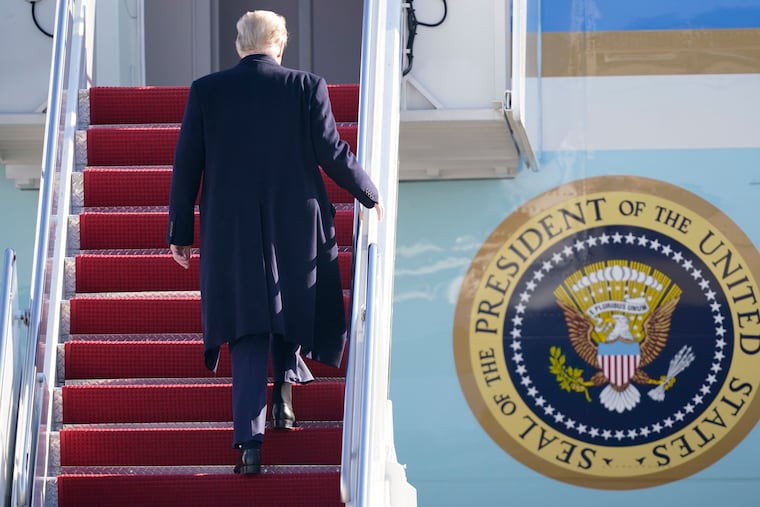Impeachment or censure? For Trump’s role in deadly Capitol attack, both. | Editorial
It is critical that Donald Trump face the consequences of his actions — and those consequences be swift.

Many questions about how the assault on the U.S. Capitol of Jan. 6 was allowed to unfold remain unanswered. But one thing is known: the role that President Donald Trump played in inciting the violence.
On Wednesday — one week after the violent assault on the Capitol that claimed five lives as well as the security of our democracy — the House of Representatives is poised to vote on an article of impeachment charging Trump with “incitement of insurrection.” Trump may become the first president in U.S. history to have been impeached twice.
» READ MORE: House speeds ahead with push to impeach Trump for Capitol insurrection
Unlike Trump’s first impeachment, which required a whistle-blower, witnesses, and documentation, the impeachable offense this time happened in public.
We know Trump incited an insurrection because he and his supporters told us. Just before his supporters stormed the Capitol, Trump told a crowd of supporters outside of the White House, “We are going to walk down to the Capitol ... you’ll never take back our country with weakness. You have to show strength, and you have to be strong.” Rioters in the Capitol said, “Our president wants us here.”
A detective wouldn’t need much red string to connect the dots between Trump’s remarks and the violence that ensued.
Because Republican Sen. Mitch McConnell still controls the Senate, it is unlikely that following the impeachment, a speedy trial will commence. That has led to some concern that an impeachment trial would saddle Joe Biden’s first 100 days agenda — including critical Cabinet confirmations, economic relief, and COVID-19 vaccination rollout.
Others are concerned that an impeachment would seem partisan and argue for a bipartisan censure.
The solution is simple.
» READ MORE: Where Pa. and N.J. members of Congress stand on impeaching Trump after the Capitol attack
An impeachment won’t seem partisan if Republicans vote for it. For Republicans like Pennsylvania Rep. Brian Fitzpatrick, who tweeted that Trump “lit the flame of incitement and owns responsibility for this,” a vote to impeach should be a no-brainer.
If some members want Trump to be censured, they should draft a resolution and put that on the floor as well. One doesn’t preclude the other.
But it is critical that Donald Trump face the consequences of his actions — and those consequences be swift. That’s particularly important because the threat of violence is not over yet. According to an FBI bulletin, “armed protests” are planned in D.C. and all state capitols in the days leading up to Biden’s inauguration.
» READ MORE: Trump shouldn’t be allowed another day in the White House. But what about complicit Pa. lawmakers? | Editorial
This moment demands that Congress do its job — and demonstrate it is capable of walking and chewing gum by handling the many big tasks before it.
On the night of Jan. 6, after enduring a severe trauma, members of Congress came back to their respective chambers to finish the people’s business. Finishing the certification of the Electoral College vote was an extremely important statement about the endurance of American democracy.
That commitment to action will be required in the coming weeks. Whether it is a short impeachment trial, or a prolonged trial, holding Trump accountable is the only path forward. It will also provide a blueprint for states to hold their own lawmakers accountable — and create a common story that the forces that allowed the U.S. Capitol to come under siege will not be tolerated.